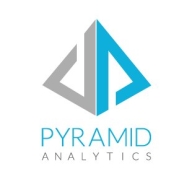

Tableau Enterprise and Pyramid Analytics compete in the business analytics and data visualization category. Tableau appears to have the upper hand primarily due to its user-friendly design and strong community support, which are critical in enhancing user experience and fostering a supportive customer service environment.
Features: Tableau Enterprise is valued for its graphical representation, data source integration, and flexibility, allowing users to create reports effortlessly with parameters and filters. Pyramid Analytics is known for advanced features such as data prediction capabilities, drill-down reports, and support for multiple data sources.
Room for Improvement: Tableau faces challenges with handling large datasets, has high pricing, limited predictive analytics, and complex licensing. Pyramid Analytics needs to enhance user-friendliness, improve training materials, and support for large datasets. Technical complexity and insufficient documentation are additional areas for Pyramid's improvement.
Ease of Deployment and Customer Service: Tableau offers various deployment options including on-premises and hybrid cloud, with excellent community support and responsive customer service. Pyramid provides similar deployment options but requires more user training and offers less intuitive support resources, which are less favorable compared to Tableau.
Pricing and ROI: Tableau's pricing is considered high, particularly for large organizations, yet users report significant ROI from its analytics capabilities. Despite its cost, the value from comprehensive data insights is notable. Pyramid Analytics, on the other hand, offers reasonable pricing for its functionalities, especially for larger businesses, with consulting services potentially adding extra costs. Its cost-effectiveness is attractive for enterprises looking for in-depth data analysis capabilities.
| Product | Market Share (%) |
|---|---|
| Tableau Enterprise | 10.3% |
| Pyramid Analytics | 0.9% |
| Other | 88.8% |


| Company Size | Count |
|---|---|
| Small Business | 6 |
| Midsize Enterprise | 1 |
| Large Enterprise | 1 |
| Company Size | Count |
|---|---|
| Small Business | 117 |
| Midsize Enterprise | 66 |
| Large Enterprise | 182 |
The BI Office from Pyramid Analytics is a web-based governed data discovery and analytics platform. It integrates the four principal functions of any comprehensive BI strategy into a single, seamless application. Users can now analyze, present, report and predict on their data in a single application. Pyramid Analytics has native apps to cover the entire mobile spectrum, iOS, Android and Windows. With BI Office users can integrate SAP data with data from other sources giving them the right tools and better data to make data-driven decisions.
Tableau Enterprise offers powerful features for creating interactive visualizations, dashboards, and maps, including drag-and-drop functionality and easy integration with multiple data sources, promoting real-time collaboration and self-service analysis.
Tableau Enterprise stands out with its ability to create user-friendly, interactive visualizations, making it pivotal for business intelligence applications. Users benefit from its seamless connectivity and advanced analytical functions, facilitating data blending and storytelling. Despite a complex learning curve and high licensing costs, its features like geospatial analysis and efficient content distribution drive its indispensable value for data-driven insights. Enhancements in predictive analytics and support integration with machine learning tools further its capabilities across industries.
What are the most valuable features?Tableau Enterprise is widely used for business intelligence, supporting industries like healthcare, telecommunications, and finance. Organizations utilize it to analyze performance indicators, operational insights, and financial analytics, enhancing decision-making through interactive reports and real-time data integration.
We monitor all BI (Business Intelligence) Tools reviews to prevent fraudulent reviews and keep review quality high. We do not post reviews by company employees or direct competitors. We validate each review for authenticity via cross-reference with LinkedIn, and personal follow-up with the reviewer when necessary.